David Trueba: Journalist, writer, actor, scriptwriter, film and television directorMISCELLANEOUS
David Trueba was born in Madrid in 1969 and studied journalism at Universidad Complutense in Madrid.
He is a press contributor. His weekly articles for El Periódico de Catalunya are collected in the anthology entitled Tragarse la lengua y Artículos de ocasión, published by Ediciones B. He is currently a TV columnist in El País.
He also works in television; he was the co-director of El Peor Programa de la Semana (1993-94) and he filmed Qué fue de Jorge Sanz (2010), a six-episode series for Canal Plus.
Regarding cinema, he has worked on the scripts of films such as Amo tu cama rica (1991), Los peores años de nuestra vida (1994), Two Much (1994), Perdita Durango (1997), La niña de tus ojos (1998), and on the documentary Balseros (2003), which was nominated for the Oscar for the best documentary of 2004. Films on which he worked as director and scriptwriter include La buena vida (1996), Obra Maestra (2000) and Soldados de Salamina (2003), Bienvenido a casa (2006) and La silla de Fernando (2006). He has also launched his career as an actor by appearing in at least nine Spanish films, such as Airbag (1997), directed by Juanma Bajo Ulloa.
As an author, he has written three novels, all published by the Anagrama publishing house: Abierto toda la noche (1995), Cuatro amigos (1999) y Saber Perder (2008), which was awarded the National Critics’ Prize in 2008 and was shortlisted for the Médicis Prize in its French version. His novels have been translated into ten languages.
“When facing risk, I trust my instincts”
In your first novel, “Abierto toda la noche”
(1995), a multiple-viewpoint novel which
seems to include some autobiographical elements,
one of the characters -the father- is
an insurance sales agent. Does that profession
evoke any family memories for you? How
would you describe them?
Of course, my father was a door-to-door
salesman for Ocaso Insurance for many years,
almost ever since I was born (I was his eighth
child). He tramped all around a district of Madrid
including Aravaca and Pozuelo, and since
he did not make enough money from insurance
to feed us all, he became a sort of doorstep
salesman for almost anything, from typewriters
to watches and bracelets. My father made
a good living as a door-to-door salesman, because
he was friendly, pleasant and full of good
intentions. His customers were very humble
people - people who could only afford a watch
by paying in installments for two years. I remember
that my father always told me that
you can trust humble people, they never leave a
bill unpaid; on the other hand, he said that rich
people do not understand the value of things
or the sacrifice they require, so he tried not to
have them among his clientele. What is more,
my father does not at all resemble the father in
that novel; for me, he was more like the grandfather
I never had, he was 53 years old when I was born, and we had a fantastic relationship
between and older man and a child in the Spain
of the 70s.
My father told me that you can trust humble people, but rich people do not understand the value of things or the sacrifice that they involve
During the period you spent at the American
Film Institute in Los Angeles, how did the
American way of life influence your way of
thinking and your work?
Perhaps it prompted me to appreciate and
enjoy the European model more, especially
the Mediterranean lifestyle. Los Angeles is a
comfortable, splendid city where I was happy
but completely unknown for me. However, it
lacks the street life of any major European city;
people there are lonely, self-interested and sad
behind their facade of success and importance.
I do not like the American way of life, it is based
too much on money and positions of power,
and there is too much social differentiation. In
Spain, the owner of a bank and one of its employees
can meet at the same places - concerts,
cafes, football matches, or on a balcony
somewhere. But not in America.
The Goya Awards of the Spanish Cinema Academy produce three times as many losers as winners
What did your role as Vice-President of the
Cinema Academy from 2004 to 2007 involve
for you personally? How would you assess the
part you played?
It was an outstanding experience. I arrived amid
a power vacuum and a very serious institutional
crisis following the famous “No to the War”
awards ceremony (referring to the Iraq war).
Nobody wanted to stand as a candidate; I was
a spokesman for the scriptwriters and I became
Vice-President after an election in which there
were no voluntary candidates. But I had to accept
the post, it was a matter of rescuing an
institution - yet I came up against the resistance from people who did not want things to
move or change; I think we managed to move
forwards and at the end of our period of office,
there were even two candidates standing for
election. I came to appreciate the merits of the
people who had been in charge of the Academy
and the sacrifice that they had made for the
group although in many cases, people were only
interested in standing out mistakes and controversies.
Fortunately, the new headquarters building
was finished, so we were able to move into
it and start offering more as an Academy than
merely the Goya Awards, which produce three
times as many losers as winners.
How did you manage to gain entry to intellectual
circles, given that you were one of the youngest?
Who are your companions, the people with whom
you keep on learning, outside the universities?
I have never been a member of any “circle”.
What happened was that when I was young,
and I had just started at university, Rafael Azcona
invited me to join a lunch group that he
hosted on Tuesdays; however, he warned me
that this was not an intellectual “circle” but rather
a meeting of friends who wanted to have
some laughs and perhaps write a script. The
people round the table kept changing, but listening
to Azcona and laughing along with him
was such a pleasure that I continued to show
up. I think that relaxed chatting, conversation
between the generations, is a major loss to
us nowadays -we must encourage it, abandon
specific age and interest groups, mix with
one another more, learn to talk and persuade
people, and to engage in amicable discussions.
The café created a way of talking that has been
lost, and when the talking stops, people usually
resort to verbal violence or rebuffs. Television
discussion sessions are just that- often they
just consist of badly-argued irrationality.
You write excellent articles on football players
or trainers. Can we say that there is a school
of journalists and writers who discuss football
and sports in general without indulging in
“gobbledygook”?
Since the start of the last century, sports
journalism has been in a class of its own. In
the USA, some of the greatest writers cut their
teeth by writing about baseball, boxing or fishing.
In Spain, perhaps, sport has always been
associated with anti-intellectualism, and that
has been a mistake. In this context, I think it is fair to recognize individuals such as Manuel
Vázquez Montalbán or Gonzalo Suárez, who
dared to dust down popular culture (and sport
is just that) and convert it into literary material.
In “Balseros” (2003), you took part as the
screenwriter. Do you think that you could
make a similar documentary on the journeys
of sub-Saharan emigrants to Europe across
the Straits of Gibraltar?
Of course, it is a matter of waiting, choosing
the right people, going along with them, and
starting out with no preconceptions. You have
to let people be more important than your own
ideology or your armchair theories. That documentary,
which I also co-produced, taught me
a marvelous lesson. Its directors, Carles Bosch
and Pepe Domenech, were tenacious and patient;
it was a pleasure to work with them on
such a complete overview of the world of forced
migration, which really is a key issue of our
times.
“La silla de Fernando” in 2006, “Rafael Azcona.
Oficio de guionista” in 2007 and now “Qué
fue de Jorge Sanz” in 2010. This fondness for
using other people’s lives as your raw material
- are these really documentaries, or is it a
question of creating a separate genre?
They are very different things. The Fernando´s
film was a challenge. Luis Alegre and I intended
that people who were not familiar with Fernán
Gómez should be able to experience the pleasure
of having a chat with him, so essentially it is almost an interactive experience. I know
people who watch the DVD again when their
spirits are low and they feel like having a chat
with someone. It is something that I feel proud
of doing, and I am glad that I did not leave it on
the shelf like some of the other projects that
you set up but never decide to carry out. The
Azcona film was a short program on his work
as a scriptwriter; I would like to recover the full
hour and a half of the conversation because as
far as Rafael was concerned, talking about his
work was basically the least important thing in
the world; however, that was the assignment
from Canal Plus and Rafael said that if I asked
the questions, he would be prepared to accept.
And the Jorge Sanz project is a fiction series,
entertaining and daring, with a kind of humor
that people are not used to in Spain; I hope it
is well received, because it aims to tackle our
inability to laugh at ourselves.
Creating a story for a film, writing a novel or
directing a feature film entail risks. They are
inevitable, of course, but how do you deal with
them? What is your attitude to risk in general?
Trust your instincts, do not take things for
granted and try not to pay too much attention
to fashion or to your previous work. In my line
of business, I think that guidelines can start
to condition you. Authenticity, and the risk of
always starting from scratch, are things that
should always be pursued. Do not look back.
What you have already done is not important in
the next film or novel. And steer well clear of success and acclaim, never forget that this is a
manual profession - a craft.
Authenticity, and the risk of always starting from scratch, are things that should always be pursued
The complex nature of a film shoot also involves
a wide range of risks: people, equipment,
transportation, locations and so on. How do
you take these risks into account when you
are planning the shoot?
It has a lot to do with the concept of “architecture”.
Predicting requirements and attempting to deal with
mishaps without changing the original commitment.
This is complicated, because it calls for a very
individual sort of strength, and at the same
time a considerable ability for teamwork – that
is often where the friction and the problems
arise. At the end of the day, choosing the right
people to have around you is more important
than your own character. Every film needs a
different team.
The people in the team for a film shoot who
are responsible for managing the specific
risks involved in the activities on a day-to-day
basis, and for deciding whether to buy insurance
cover - do they keep you informed?
Well, as a director you have a medical examination
as do the actors, and everyone who would
cause the shoot to be stopped if they dropped
out. I remember that when I was working with
Luis Cuenca, he was already quite old and his
health was in such a precarious state that the
insurance companies would not sign the clause
for him; but in a case like that, you have to take
the final decision and for me, the pleasure of
filming him -and he was in my films until the
day he died- far outweighed any risk that I had
to take on. Audiences like you to film special,
unusual people.
Scriptwriter, novelist, author of articles, actor
and film director - When will you turn your
hand to production? Have you ever thought of
putting one of your novels on the screen?
No, my novels are fine as they are. I wrote them
to be novels, not films. But in the cinema, it is
essential to become a producer, it is the only
way to generate your own projects, rather than
becoming somebody else’s paid hand working
on other people’s projects. Eventually, you start
to understand what finance is all about. The age
of the great Hollywood studios is over. From the
1960s onwards, the major writers have had to
be director-producers.
My novels are fine as they are. I wrote them to be novels
If we want to enjoy your next work, will we
have to go to the cinema or to a bookshop?
I do not know yet. Sometimes you start at one
point, but then you think of another project and
it becomes uppermost in your mind. What I
do know is that I shall be doing things, I like
doing things; in my work, you do not have to
dream - you have to do things, to tackle the
job - and do not let anyone tell you otherwise.
This is a trade like any other, it involves effort and
tenacity, and putting in the hours. Last summer,
for instance, I shot a film called “Madrid, 1987”.
The television channels offered no financing
and they were not enthusiastic but the actors
and my technicians were; so, under very difficult
conditions but with absolute dedication,
we shot the film as cheap-ly as we could, and
with superb commitment. What will happen to
this film now, when I finish editing it? I do not
know, I do not have any distribution or support,
but now it is finished - mission accomplished.
This is the great joy of doing something, when
you are confronted with defeat due to despair
or resentment because nothing moves. I hope
to maintain this strength of spirit as long as I
keep my physical strength.
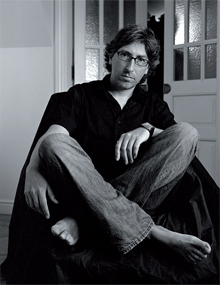

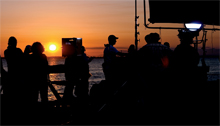
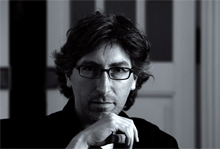
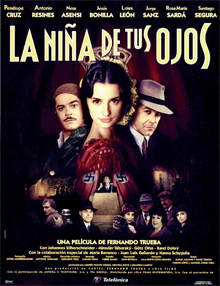
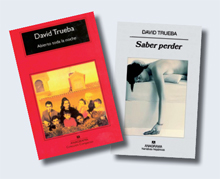
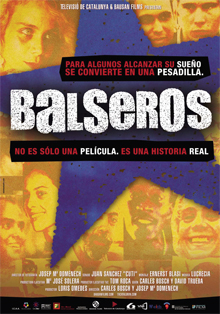
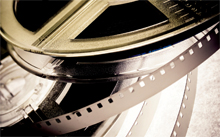
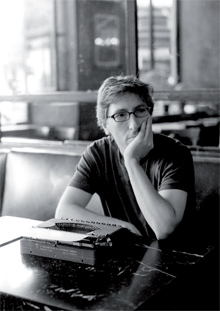 David Trueba, during the shooting of his film “Madrid, 1987”, at Café Comercial in Madrid
David Trueba, during the shooting of his film “Madrid, 1987”, at Café Comercial in Madrid

